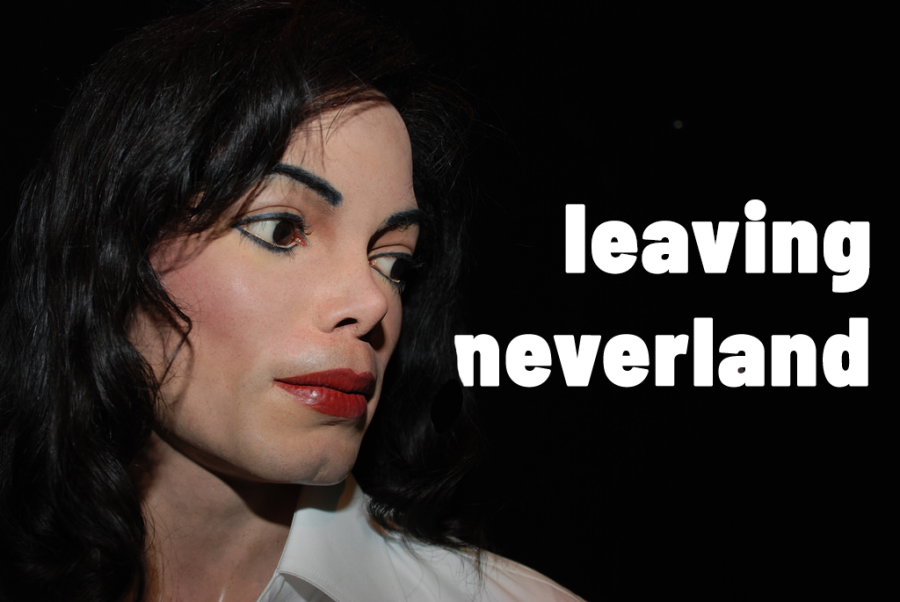Smooth Criminal: Uncovering the allegations against pop icon Michael Jackson
April 12, 2019
“Smooth Criminal,” one of the most celebrated songs from pop music icon Michael Jackson, is now being used to describe the singer himself. A documentary about the singer and his alleged sexual abuse of young boys, titled “Leaving Neverland,” was released at the Sundance Film Festival on Jan. 25 and aired on HBO Now on March 3, stirring up much controversy. The documentary features Australian dancer Wade Robson and American actor Jimmy Safechuck opening up about being sexually abused by Jackson when they were children. Ever since the documentary’s release, it has been subject to aggressive debate between fans of Jackson and supporters of Robson and Safechuck. Topics like Jackson’s legitimacy as the “King of Pop,” the stories of the two men and the hidden secrets of Jackson’s personal estate, Neverland Ranch, have become key points in the controversy. Amid the debate, it is important to understand the implications of the crimes that Jackson committed, as well as the correct way to handle allegations about the deceased, who can no longer defend themselves.
In the days since its release, “Leaving Neverland” has left many conflicted about Jackson’s legacy, primarily because the documentary is an in-depth examination of Jackson’s crimes against Robson and Safechuck and does not shy away from the harsh details of both men’s experiences. Jackson’s now-closed Neverland Ranch, a 2800-acre property located in Santa Barbara County, Calif., that included a private amusement park and a petting zoo, was open to children invited by Jackson and became the hot spot of his alleged crimes. In the documentary, Robson, at the age of five, is said to have befriended then 30-year-old Jackson, and at the age of seven, when he moved to Los Angeles, Robson was invited to temporarily stay at Neverland Ranch with Jackson. From then on, Robson was allegedly subject to sexual abuse for seven years. In Safechuck’s case, he allegedly met Jackson when he was nine years old, while they were filming a Pepsi commercial together. At the age of 10, Safechuck says he “got married” to Jackson, who gave him a wedding ring. Afterward, he accused Jackson of sexually abusing him and using the marriage as justification.
“[Jackson] was always considered as eccentric and as having something off about him,” said World and American Literature teacher Jessica Dunlap. “I always thought there was a weird disconnect between the persona portrayed in his songs, where he showed a lot of bravado and manliness, and the person that he was [in public], as he was skinny and did not look like a tough character. I do not think that with the immense fame that he received, people would think of him as a pedophile, but his eccentricity made the allegations unsurprising.”
Since both men only revealed their stories more than 20 years after they were allegedly abused, many question the veracity of their statements, as well as the role of their parents during their childhoods. However, both Robson and Safechuck say that, along with themselves, their parents were “groomed,” or brainwashed, by Jackson to believe that the abuse was completely normal, to help Jackson’s crimes go undetected.
“Due to the #MeToo Movement, victims of sexual abuse now have the courage and long-overdue opportunity to speak up and effect positive change together,” senior Joyce Ker said. “I believe that with this voice comes the obligation for all victims to hold themselves to high moral standards when making accusations.”
In addition to these recent allegations against Jackson, other individuals have accused Jackson of abuse in the past. In 1993, 13-year-old Jordan Chandler accused Jackson of sexual abuse. After a yearlong legal battle, Jackson made a settlement with the Chandler family for $23 million. Though the case was closed, Jackson’s image was heavily tarnished. Not only did he lose many brand endorsements, but he also had to cancel his “Dangerous” music tour. Eleven years after his first sexual abuse case, Jackson was accused of sexual abuse again, in the 2004-2005 People v. Jackson trial. Jackson said that he found nothing wrong with sleeping in the same bed as young boys, and pleaded not guilty. Robson testified during the trial, refuting any claims of Jackson abusing him, but now blames his statements during the trial on being “groomed” by Jackson for so long during his childhood. Though Jackson was acquitted in the trial, his reputation was hurt. As a result of the accusations and financial problems related to the declining popularity of the ranch, Jackson’s Neverland Ranch property also closed down.
Due to the severity of Jackson’s alleged crimes, many of Jackson’s fans remain shocked and uncertain of how to react and perceive Jackson. However, many of Jackson’s staunch followers refuse to believe the accusations, in turn accusing Robson and Safechuck of charging Jackson with sexual abuse only for publicity and for the purpose of deliberately tarnishing his legacy. The fact that it has also been 10 years since Jackson died makes it harder to investigate the case, as it is impossible for Jackson to testify.
“One thing is clear: the dead cannot be prosecuted,” said Dr. George Fisher, professor of law at Stanford University. “Mr. Jackson is beyond the reach of criminal law.”
Whatever the outcome of the controversy, it is important for all people, whether Jackson’s fan or not, to take in the accusations and realize their gravity. Every person needs to be able to reevaluate how they see their idols and understand that no one is perfect, a common perception of famous figures.
“I get that people feel conflicted [regarding the allegations] and want to preserve their love for Jackson,” Dunlap said. “But, as an audience, we should always maintain a sense of neutrality and understand that all people with fame have personas. We have to keep in mind that there is a real person underneath that persona and they are not always happy and confident. It is an illusion to think Michael Jackson was perfect.”
Such high-profile cases show how prevalent abuse is and serve as opportunities for people to destigmatize discussions on abuse and ways to deal with the repercussions for the victims, as well as the abusers. The victims took more than 20 years to speak up, because of the discomfort they felt due to the taboo surrounding abuse, in addition to being brainwashed to think that abuse was acceptable. Creating a safe space for victims to speak up is imperative, as it takes a lot of bravery to speak about something so personal.
“The [Jackson] allegations are important from the standpoint that they point out that persons of power should not be allowed to do anything they want to do, without all people using their common sense to ask, ‘Is it appropriate for this person to be so closely associated with minor children?’” said Dr. Terry Ellis, professor of law at De Anza College. “The situation should be used as an example of what not to do or allow to happen.”




























































